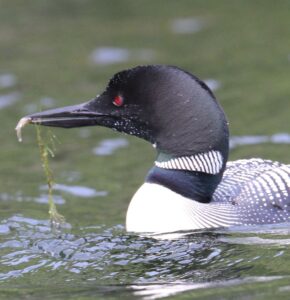POINTLESS WORDS DON’T MAKE A POINT
A few days ago I spent some time with the loon family I wrote about last week. The parents called out twice, to help the two chicks find them in the choppy waves, which prompted the thought that my exasperation with news coverage, and the world in general, is directly related to the excessive use of pointless words.
Kinda, sort of, you know, obviously, I mean, and often a combination of two or more of those, clutter the utterances of pundits, experts, newsmakers and ordinary people being asked their opinions.
Interviewees are supposed to be afforded air time because they know what they’re talking about.
Kinda and sort of are bet-hedgers.
Obviously is talking down to the audience. If something is obvious, it can be presumed we know it and don’t need our time wasted by repetition.
Ditto you know.
Unless it’s a prelude to re-answering a question in a clearer way, or correcting an error in the original answer, I mean prompts the question: “If you don’t mean it, why are you about to say it?”
The phrase is almost annoying as people who are always super happy, excited, disappointed and on and on…
They’re on a par with those who say “like” when the word doesn’t fit. I allow journalists two and interviews three, then hit the off button.
Vague and excessive, as opposed to crisp and clear information, is a waste of time.
 Just ask a loon parent…because when the fish are small, they don’t have time to waste waiting for the chicks to answer the loon equivalent of a “lunch is served” call.
Just ask a loon parent…because when the fish are small, they don’t have time to waste waiting for the chicks to answer the loon equivalent of a “lunch is served” call.
Speaking clearly, without pointless words, is the fundamental of communicating ideas and credibility.
It’s how the great broadcasters of radio and pre-swallowed-by-greedy-mergers-TV earned trust and dedicated audiences.
SIMPLIFICATION IS AN ART
No less than a Shakespeare character noted that “brevity is the soul of wit”.
Lapsing into the jargon of the moment doesn’t equate with clever, it diminishes the value of information and certifies a paucity of intellect.
People whose second or third language is English often seem much more capable, and certainly creative, when it comes to simple and descriptive.
A Greek friend told me proudly that his wife kept their home “sparkless”, by which he meant spotless and sparkling. Praise indeed, and only one word needed.
A Lebanese driver for CBS News with an uncanny ability to read and defuse potentially dangerous situations, described checkpoints manned by gunmen whose attitudes and intelligence levels might range from unpredictable to certifiably homicidal (and no “kinda” or “sorta” about it), as “no troblem”…a (vaguely) reassuring combination of “no trouble” and “no problem”.
Cockney rhyming slang, on the other hand, uses two or three word phrases, which fluent speakers often turn back into one.
A simple example: “I was on my way out for a pig’s when the trouble called on the dog and wanted bangers for new ten to twos and her Barnet and boat race done.”
Translation: pig’s ear — pint of beer, Trouble and strife — wife, dog and bone — phone, ten to twos — shoes , bangers and mash — cash, Barnet Fair– hair, boat race — face.
One wonders how AI would handle that.
Announcing a new “superintelligence” his engineers are working on, Mark Zuckerberg claimed it will play a role that “…empowers people to be more creative, develop culture and communities, connect with each other, and lead more fulfilling lives.”
Thus pronounced the creator of the world’s most widely used forum for practitioners of ill-considered pronouncements and excess verbiage.
ON A HIGHER LEVEL
Worse still are words used by those who ought to know when they are misleading, or plain wrong.
The last half of a headline on a story about U.S. special envoy Steve Witkoff going to visit an “aid distribution site” in Gaza read: “…Envoy Plans to See Hunger Crisis Firsthand”.
The reporter and headline writer knew (or ought to have, given the number of words published about Israeli restrictions on access to Gaza) that Witkoff was going on what journalists call a “dog and pony show”.
He would not, and in the end did not, see or speak to, a single hungry Palestinian, or anyone not approved by the Israelis, nor experience Gaza’s daily lot of “warning shots”, air strikes, tank fire or drone attacks.
Days after the United States hit Canada with higher tariffs, Prime Minister Mark Carney said he would speak with U.S. President Donald Trump “when it makes sense.”
“Sense” and “Trump” not being words that go together, to fill what might be a long wait, I’d like to suggest Mr Carney could send Trump a picture (gold framed of course) of a loon.
Whether His Trumpness would see it as equating him with the iconic status we afford the bird, or the pejorative use of the bird’s name, it’s perilously (or cleverly) close to the alleged Canadian trait of being passive-aggressive.
And no words wasted.
Comments are welcomed. Click CONTACT on the site header.
To receive e‑mail alerts to new posts, Click SIGN-UP on the header.
5 thoughts on “POINTLESS WORDS DON’T MAKE A POINT”
Thank you. Well done.
Thanks Steve
Well done.
Thanks Allen, well done.
Pointed, Pizz!
I obviously prize my role at Wknd News adding content to my banned word list. I counted three ‘continues’ in one script Sunday. I blazed — mercilessly. Hope you’re well. Nothing more spectacular than sighting a Loon family — and hearing them call out!